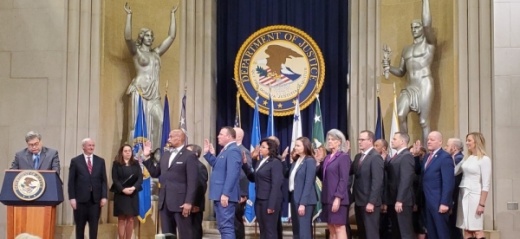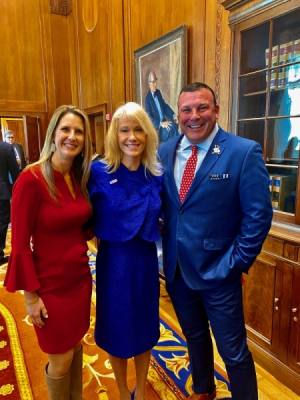The commission, at the direction of President Donald Trump, was created to explore modern issues affecting law enforcement and the ability to reduce crime.
Trump signed Executive Order No. 13896 in October, designating and authorizing Attorney General William P. Barr. to create the commission and assemble its members. Barr appointment Frazier, along with 15 other law enforcement officials from around the U.S.
“There is no more noble and important profession than law enforcement,” Barr said in a Department of Justice press release. ... “But as criminal threats and social conditions have changed the responsibilities and roles of police officers, there is a need for a modern study of how law enforcement can best protect and serve American communities.”
The commissioners will work together to discover and study opportunities for progress, improvement and innovation across American law enforcement, Frazier said.
The president’s executive order instructs the commission to conduct its study by focusing on current issues, such as the following:
Challenges to law enforcement associated with mental illness, homelessness, substance abuse, and other social factors that influence crime and strain criminal justice resources;
- The recruitment, hiring, training and retention of law enforcement officers;
- Refusals by state and local prosecutors to enforce laws or prosecute categories of crimes;
- The need to promote public confidence and respect for the law and law enforcement officers; and
- The effects of technological innovations on law enforcement and the criminal justice system, including the challenges and opportunities presented by such innovations.
- Commissioners will study these issues through a series of hearings, panel presentations, field visits and other public meetings, where they will speak with experts, public officials, citizens and other stakeholders.
This commission is “critical” and is made up of members that “truly reflect the best there is in law enforcement,” Barr said in the release.
The appointed members range from urban police chiefs, state prosecutors, county sheriffs, members of rural and tribal law enforcement, federal agents, U.S. Attorneys and a state attorney general, according to the release, and their diverse backgrounds will be useful in formulating the best practices.
Frazier, who has an extensive background in law enforcement, said he is looking forward putting his expertise to work.
Frazier has spent 24-years with the Dallas Police Department and more than 15 years with the U.S. Marshals Task Force. He is also a member of the Fraternal Order of Police, which oversees government affairs for police at the state level, and serves as Vice President of the Dallas Police Association, where he works closely with area law enforcement officials to provide guidance on labor and law enforcement issues.
“I am honored to be asked to serve not only my country but the city I have worked my entire career to protect and my brothers and sisters in blue,” Frazier said in the release. “Crime is a growing problem, and my hope is that ... our commission will lay out a blueprint that can be used to implement smart modern solutions that will make families safer all over America.”





